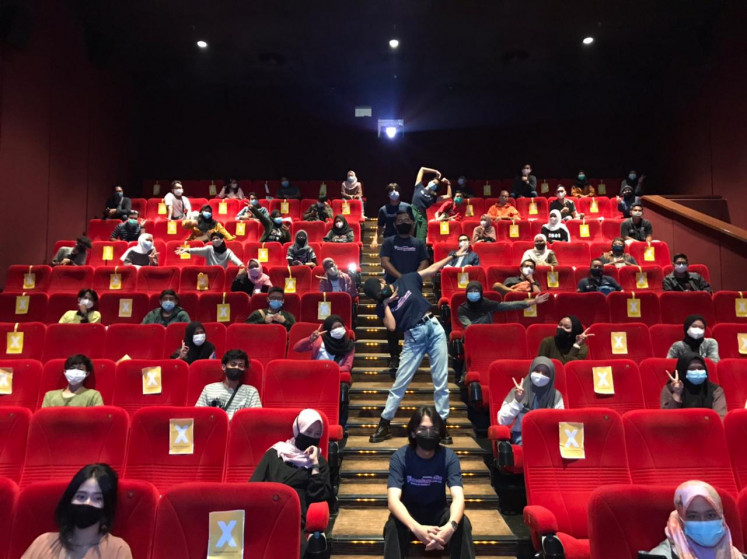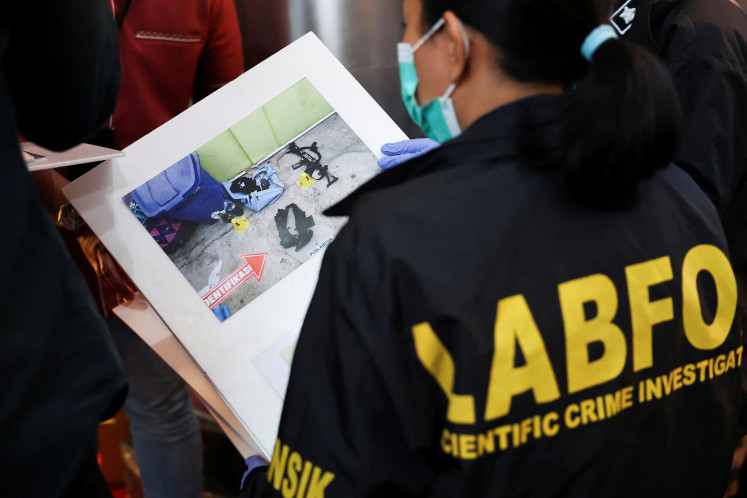Popular Reads
Top Results
Can't find what you're looking for?
View all search resultsPopular Reads
Top Results
Can't find what you're looking for?
View all search resultsIndonesian film industry meets challenges and glory during pandemic
Films that have tried to screen during the pandemic have failed to live up to already-low expectations. But some filmmakers try to look on the bright side.
Change text size
Gift Premium Articles
to Anyone
I
remember how lucky I felt managing to get tickets to see the independent Indonesian film The Science of Fictions at its national premier at the Jogja-NETPAC Asian Film Festival (JAFF) in 2019, People were fighting over tickets like it was a holiday blockbuster.
The 200-seat capacity studio was packed, and as the film started, people were still queuing outside, hoping for canceled tickets.
The enthusiasm was not surprising. People were curious to see the film, since it had won prestigious international awards before premiering in Indonesia.
Yosep “Anggi” Noen had already garnered a lot of attention. His artistic approach—the non-straightforward narrative, slow-paced and minimal dialogue—was celebrated by an audience looking for an approach beyond the mainstream formula. His previous feature film, Solo, Solitude (2016), based on the life of poet-activist Wiji Thukul, was seen by more than 50,000 viewers - a notable number for an indie film.
But the euphoria seemed to subside once The Science of Fictions hit local cinemas on Dec. 9, 2020. It was among the first films in Indonesia to be screened after nine months of cinemas being closed.
The film was seen by no more than 6,500 viewers, staying barely a month in cinemas already short of movies.
“Regular screenings were attended by fewer than 10 people per session. I also […] received reports, through social media, from people who found themselves to be the only person in the audience,” Anggi said.
“We actually screened the film in many cities. But we understood how it was. People were still afraid to come to the cinema,” he added.
The film’s release went through many delays, affected by the government’s changing policies.
“Sometimes I felt tired. My energy had already run out once the film was finally screened, but I also had to keep going. A film is like your own child, after all.”
The release of The Science of Fictions was followed on screen by Generasi 90an: Melankolia (Nineties generation: melancholy) a few weeks later. It was originally planned for April 2020.
Based on the best-selling book Generasi 90an, it was Mohammad Irfan “Ipang” Ramly’s debut as a director. The film touches the issue of family and grief, subjects close to the director’s personal experience.
“When I was a teenage boy, I lost my older sister because of an illness. The experience changed me as a person, and I wanted to show in the film how grief could bring people to a point that they had never imagined,” Ipang said.
Ipang had previously worked as a scriptwriter for numerous films produced under Visinema Pictures—a production house founded by film professionals in their twenties and thirties. One Day We’ll Talk About Today (2019), a film Ipang cowrote the screenplay for, was seen by more than 2 million viewers.
The success of One Day We’ll Talk About Today did not translate into Generasi 90an. The film was strategically released on Dec. 24, usually a good date for film releases as it is in a long holiday. Ipang did not disclose audience numbers, but said it did not have much effect.
The decision to release the film during the pandemic was simply practical, Ipang said. “We just thought releasing the film was the right thing to do to support the industry’s ecosystem. The production house and the cinema are in need of each other, we still have to support it even in times of crisis like now,” he said. “Nothing sentimental or emotional about it.”
The cast and crew of 'Melankolia' during a screening at one of their roadshow tours to promote it (Courtesy of Visinema Pictures/Visinema Pictures)Both Ipang and Anggi agree that the pandemic presents a tricky situation for the film industry, and it was also dilemmatic for them to ask people to watch their films. Anggi said their team could not pursue an aggressive marketing approach and instead campaigned on how to watch safely. “We need to remind the audiences to keep their physical distance, wear masks, and not to go to the cinema when they feel sick.”
Ipang said, “Ideally, we need to ask people to stay at home to suppress the spread of the virus.”
The Cinema Experience
Panji Nandiasa Mukadis, the founder of film website InfoScreening and an avid cinema goer, has not gone to the cinema since the start of the pandemic. His reason is more practical than a fear of COVID-19.
“There are not many international films to choose from, and I have seen most of the local ones in the festivals,” he said.
He misses going to the cinema. “The experience is different compared with watching alone at home. At home, it’s easier to be distracted and stop watching in the middle of the film. The ‘sensation’ is different,” Panji said.
This longing of the cinema experience is what drove Anggi and Ipang to release their films during the pandemic.
“I could not imagine The Science of Fictions being viewed on a small screen,” Anggi said. “The shot, the camera movement, the lighting, they were all designed for the cinema. Even though there weren’t many audience members, I am relieved that at least the film was presented in its designed set-up.”
“Some films lose their magic on the small screen. They have these exquisite audiovisual elements that also need proper infrastructure.”
While the pandemic in Indonesia is not about to end soon, more films are announcing their release dates. Epidemiologist Pandu Riono said that “the [cinemas] have followed the measurements set by the government, so you don’t have to worry. The risks are already suppressed as long as you keep wearing a mask, do not consume any food and drinks, and do not talk inside,” Pandu explained.
For Firda F. Nisa, a film enthusiast who tweets as @cinemuach (roughly translating as cinema smooches), the cinema experience is also about the communal experience between audience members.
She has been to the cinema five times since the pandemic began, and felt something missing inside the quiet theater: she misses being able to laugh or scream together as a crowd, and the after-film chats, sometimes with strangers.
“Before the pandemic, every time I went to a festival or film premier, I would happen to meet new friends with whom I could discuss films. Now, I have to reduce that intense desire to interact, and rush back home.”
But for Anggi Noen, a pandemic release date has its wonders. Anggi was moved by audiences who still came to see his film despite the risks. With his cast and crew, he visited several cinemas in Jakarta and Yogyakarta to personally say thank you to viewers.
“It felt like going to a wedding: greeting the bride, groom and the family members one by one. With 6,500 people who have seen The Science of Fictions in the cinema, there are also 6,500 memories created. It was an intimate, exceptional experience.”











